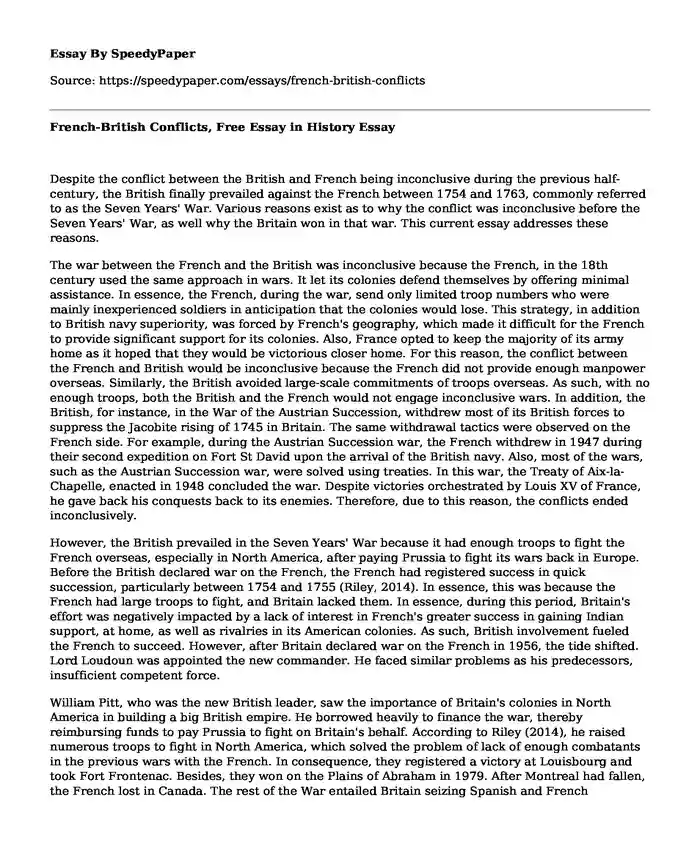
| Type of paper: | Essay |
| Categories: | History International relations War |
| Pages: | 3 |
| Wordcount: | 679 words |
Despite the conflict between the British and French being inconclusive during the previous half-century, the British finally prevailed against the French between 1754 and 1763, commonly referred to as the Seven Years' War. Various reasons exist as to why the conflict was inconclusive before the Seven Years' War, as well why the Britain won in that war. This current essay addresses these reasons.
The war between the French and the British was inconclusive because the French, in the 18th century used the same approach in wars. It let its colonies defend themselves by offering minimal assistance. In essence, the French, during the war, send only limited troop numbers who were mainly inexperienced soldiers in anticipation that the colonies would lose. This strategy, in addition to British navy superiority, was forced by French's geography, which made it difficult for the French to provide significant support for its colonies. Also, France opted to keep the majority of its army home as it hoped that they would be victorious closer home. For this reason, the conflict between the French and British would be inconclusive because the French did not provide enough manpower overseas. Similarly, the British avoided large-scale commitments of troops overseas. As such, with no enough troops, both the British and the French would not engage inconclusive wars. In addition, the British, for instance, in the War of the Austrian Succession, withdrew most of its British forces to suppress the Jacobite rising of 1745 in Britain. The same withdrawal tactics were observed on the French side. For example, during the Austrian Succession war, the French withdrew in 1947 during their second expedition on Fort St David upon the arrival of the British navy. Also, most of the wars, such as the Austrian Succession war, were solved using treaties. In this war, the Treaty of Aix-la-Chapelle, enacted in 1948 concluded the war. Despite victories orchestrated by Louis XV of France, he gave back his conquests back to its enemies. Therefore, due to this reason, the conflicts ended inconclusively.
However, the British prevailed in the Seven Years' War because it had enough troops to fight the French overseas, especially in North America, after paying Prussia to fight its wars back in Europe. Before the British declared war on the French, the French had registered success in quick succession, particularly between 1754 and 1755 (Riley, 2014). In essence, this was because the French had large troops to fight, and Britain lacked them. In essence, during this period, Britain's effort was negatively impacted by a lack of interest in French's greater success in gaining Indian support, at home, as well as rivalries in its American colonies. As such, British involvement fueled the French to succeed. However, after Britain declared war on the French in 1956, the tide shifted. Lord Loudoun was appointed the new commander. He faced similar problems as his predecessors, insufficient competent force.
William Pitt, who was the new British leader, saw the importance of Britain's colonies in North America in building a big British empire. He borrowed heavily to finance the war, thereby reimbursing funds to pay Prussia to fight on Britain's behalf. According to Riley (2014), he raised numerous troops to fight in North America, which solved the problem of lack of enough combatants in the previous wars with the French. In consequence, they registered a victory at Louisbourg and took Fort Frontenac. Besides, they won on the Plains of Abraham in 1979. After Montreal had fallen, the French lost in Canada. The rest of the War entailed Britain seizing Spanish and French territories in the rest of the world. The Treaty of Paris concluded the war in 1963, where France handed British Canada. Therefore, the British-French conflict was inconclusive due to lack of troops to fight overseas and lack of dedication from either party to engage in war in the half century culminating the Seven Years' War. However, the Britain prevailed over the French due to commitment and availability of large troops to fight in the war.
Works Cited
Riley, James C. The Seven Years' War and the old regime in France: the economic and financial toll. Princeton University Press, 2014. Print.
Cite this page
French-British Conflicts, Free Essay in History. (2019, Oct 01). Retrieved from https://speedypaper.net/essays/french-british-conflicts
Request Removal
If you are the original author of this essay and no longer wish to have it published on the SpeedyPaper website, please click below to request its removal:
- US Prison System Described by This Free Essay Example
- Essay Example on Ethical Dilemmas in Life Support
- Nursing Essay Sample on the Bedside Skin Nurses' Champions Program
- Media Essay Sample: The Impact of Twitter on Agenda Sitting in Newsroom - Dubai News Center
- Free Essay Sample: Bioenergy and Its Environmental Properties
- Cooking Essay Example: How to Make a Baked Alaska
- Observation in a Night Club
Popular categories




